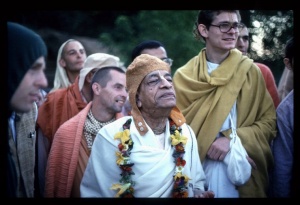SB 1.18.22 (1965)

A.C. Bhaktivedanta Swami Prabhupada
TEXT No. 22
Yatra anuraktah sahasa eva dheerah Vyapohya deha adisu samgam udham Baajanti tat paramhansam antam Yasmin ahimsa upasamam swadharmah.
ENGLISH SYNONYMS
Yatra—unto whom Anuraktah -firmly attached, Sahasa—all of a sudden, Eva—certainly, Dheerah—Self controlled, Vyapohya—leaving aside, Deho—the gross and subtle mind, Adisu—relating to, Samgam-attachment, Udham—taken to, Braja ti—go away, Tat—that, Paramahansam—the highest stage of perfection, Antyam—and beyond that, Yasmin—in which, Ahimsa—non-violence, Upasamam—and renunciation, Swadharmah—sequential occupation.
TRANSLATION
Self controlled persons who are attached to the Supreme Lord Sri Krishna all of a sudden give up the world of material attachment in relation with the gross body and subtle mind and go away to attain the highest perfection of renounced order of life in which non-violence and renunciation are sequential occupations.
PURPORT
Only the self-controlled persons can gradually be attached with the Supreme Personality of Godhead. Self controlled means those who do not indulge in the matter of sense enjoyment more then what is necessary. And those who are not self controlled they are given to the matter of sense enjoyment. Dry philosophical speculation is also subtle sense enjoyment of the mind. Sense enjoyment leads one to the path of darkness and those who are self controlled can make progress on the path of liberation form the conditional life of material exisence. The Vedas, therefore, enjoins that one may not go on the path of darkness but one may make progressive march towards the path of light or liberation form material conditions. Self control is actually achieved not by any artificial means of stopping the senses from material enjoyment but it can be so obtained when one is factually attached with the Supreme Lord by engaging one's unalloyed senses in the transcendental service of the Lord. The senses cannot be forcibly curbed down but they must be given proper engagement. Purified senses are, therefore, always engaged in the transcendental service of the Lord and as such perfectional stage of sense engagement is called the Bhaktiyoga. So those who are attached to the means of Bhaktiyoga are factually self controlled and do all of a sudden give up their homely or bodily attachment and give them up completely in the service of the Lord which is called Param hansya stage. Hansas or the swans do accept the milk only out of a mixture of milk and water. Similarly those, who accept the service of the Lord instead of the matter are also called the Paramhasas. Such paramhansas are naturally qualified with all the good attributes such as pridelessness, non vanity, nonviolence, tolerance, simplicity, respectability, worship devotion, sincerity and all those godly qualities exist in the devotee of the Lord spontaneously. Such Paramhansas who are completely given up to the service of the Lord are very rare. They are very rare even amongst liberated souls. Real nonviolence means not to be envious. In this world everyone is envious of his fellow being. But a perfect Paramhansa being completely given up to service of the Lord is perfectly non-envious. He loves every living being in relation with the Supreme Lord and real renunciation means to have perfect dependence in God. Every living being is dependent on somebody else, because, he is so made. Actually one is dependent on the mercy of the Supreme Lord but when one forgets his relation with the Lord he becomes dependent on the conditions of material nature. Renunciation means to renounce one's dependence on the conditions of material nature and thus be completely dependent on the mercy of the Lord. Real independence means to have complete faith in the mercy of the Lord without being dependent on the conditions of matter. This Paramhansa stage is the highest perfectional stage in the matter of Bhaktiyoga or the process of devotional service of the Supreme Lord.